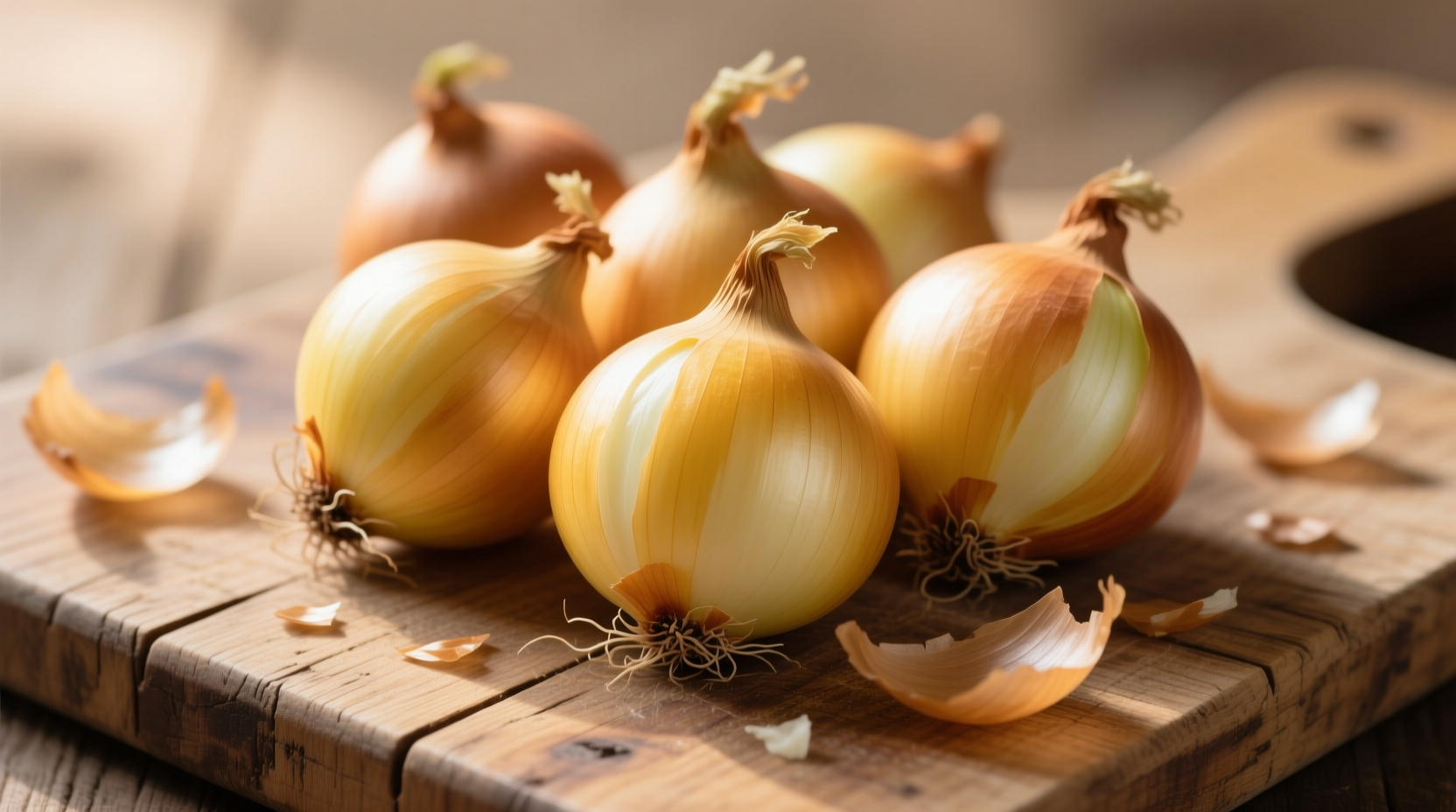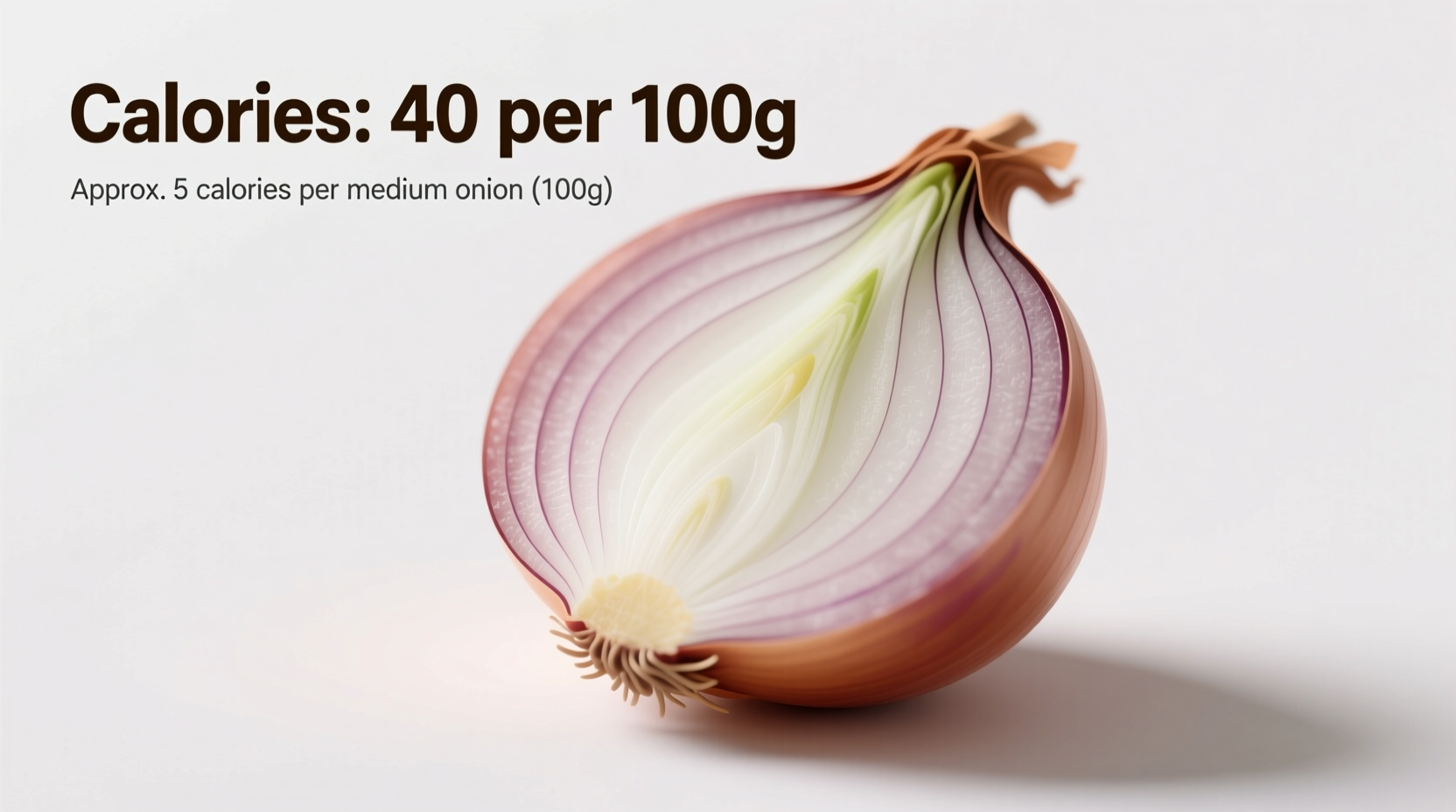Onions are culinary staples that add depth and flavor to dishes without significantly impacting your daily calorie intake. Understanding their exact nutritional profile helps health-conscious cooks and meal planners make informed choices. Let's explore the calorie content of onions in practical detail.
Onion Calorie Basics: What You Need to Know First
When tracking calories, knowing the precise nutritional value of common ingredients like onions is essential. The calorie count varies slightly based on onion type, size, and preparation method, but all varieties remain remarkably low in calories while offering valuable nutrients.
According to the USDA FoodData Central database, the standard nutritional profile for raw onions is consistent across most common varieties:
| Onion Type | Calories per 100g | Carbohydrates (g) | Fiber (g) |
|---|---|---|---|
| Yellow Onion (most common) | 40 | 9.3 | 1.7 |
| Red Onion | 40 | 9.5 | 1.8 |
| White Onion | 42 | 9.7 | 1.9 |
| Sweet Onion (Vidalia, Walla Walla) | 38 | 8.9 | 1.6 |
This nutritional consistency across varieties makes onions a reliable low-calorie ingredient regardless of which type you choose for your recipes. The minor differences primarily stem from slight variations in water content and natural sugar levels.
Real-World Serving Sizes and Calorie Counts
Understanding how these numbers translate to actual cooking scenarios is crucial. Here's what you'll encounter in everyday meal preparation:
- One medium onion (110g): 44 calories - perfect for sautéing as a base for soups, stews, or sauces
- One cup chopped raw onion (160g): 64 calories - common measurement in salad recipes
- One tablespoon chopped onion (16g): 6 calories - ideal for garnishing or adding subtle flavor
- One small onion (50g): 20 calories - frequently used in kebabs or as a side
These measurements help you accurately track your intake whether you're following a strict diet plan or simply monitoring your nutritional habits.
How Cooking Methods Affect Onion Calories
While raw onions maintain their low-calorie profile, preparation methods can significantly impact the final calorie count of your dish:
- Raw onions: Maintain their natural 40 calories per 100g - ideal for salads, salsas, and fresh garnishes
- Sautéed onions: Calories remain similar per onion, but oil or butter added during cooking increases the total (approximately 120 calories per tablespoon of oil)
- Caramelized onions: The natural sugars concentrate as water evaporates, slightly increasing calories per volume (about 50 calories per 100g after caramelization)
- Fried onions (like onion rings): Calorie count increases dramatically due to absorbed oil (can reach 300+ calories per 100g)
For those tracking calories carefully, steaming or roasting onions without added fats preserves their naturally low-calorie profile while enhancing sweetness through natural caramelization.

Nutritional Benefits Beyond Calories
Onions offer impressive nutritional value that extends far beyond their minimal calorie count. They're packed with beneficial compounds that contribute to overall health:
- Vitamin C: One medium onion provides about 11% of your daily requirement, supporting immune function
- B vitamins: Particularly B6 and folate, essential for energy metabolism
- Antioxidants: Quercetin and other flavonoids with anti-inflammatory properties
- Prebiotic fiber: Inulin supports gut health by feeding beneficial bacteria
- Sulfur compounds: Responsible for onions' pungent aroma and potential cardiovascular benefits
According to research published in the Journal of Agricultural and Food Chemistry, red onions contain particularly high levels of anthocyanins - the same antioxidants found in blueberries - which may offer additional health benefits compared to other varieties.
Practical Applications for Meal Planning
Understanding onion calories helps you make strategic decisions in meal preparation:
- Diet-friendly flavor boost: Add substantial flavor to dishes without significant calorie impact - perfect for weight management
- Volume eating strategy: Incorporate generous amounts of onions in stir-fries and salads to increase meal volume while keeping calories low
- Smart substitution: Replace higher-calorie ingredients with onions in recipes (e.g., using onion instead of some meat in tacos)
- Balanced blood sugar: The fiber content helps moderate the glycemic impact of carbohydrate-rich meals
Chef Antonio Rodriguez notes: "Onions are my secret weapon for building flavor without excess calories. A properly caramelized onion can transform a simple dish into something extraordinary while adding minimal calories to the final plate."
Common Misconceptions About Onion Calories
Several myths persist about onion nutrition that deserve clarification:
- "Sweet onions have significantly more calories" - While slightly higher in natural sugars, the difference is minimal (about 2-4 calories per 100g more than yellow onions)
- "Cooking removes all nutritional value" - While some heat-sensitive nutrients decrease, cooking actually increases the bioavailability of certain antioxidants
- "Onions cause weight gain" - With only 40 calories per 100g, onions are extremely unlikely to contribute to weight gain when consumed in normal culinary amounts
- "All onions have identical nutritional profiles" - While similar, red onions contain more antioxidants, and sweet onions have slightly higher sugar content
These clarifications help ensure you're making decisions based on accurate nutritional information rather than common misconceptions.
Tracking Onion Calories in Your Diet
For those using food tracking apps or maintaining a food journal, here are practical tips:
- When recipes call for "one onion," assume medium size (110g/44 calories) unless specified otherwise
- For precision, weigh onions before preparation as water loss during cooking changes weight-based measurements
- Remember that cooking concentrates flavors but also reduces volume - 2 cups of raw onions may yield only 1/2 cup after caramelization
- Account for any added fats when calculating total dish calories
Registered dietitians often recommend keeping a small kitchen scale specifically for measuring ingredients like onions when precise calorie counting is necessary.
Onions in Popular Diets
Onions fit well within various dietary approaches due to their low calorie density and nutritional benefits:
- Mediterranean diet: Onions are a fundamental component of sofrito and other flavor bases
- Keto diet: While higher in carbs than some vegetables, onions can be used in moderation (1/4 cup provides about 2g net carbs)
- Plant-based diets: Essential for building savory flavors without animal products
- Diabetes management: The fiber content helps moderate blood sugar response when paired with carbohydrates
The American Diabetes Association specifically recommends including onions in diabetes-friendly meal plans due to their low glycemic load and beneficial compounds.











 浙公网安备
33010002000092号
浙公网安备
33010002000092号 浙B2-20120091-4
浙B2-20120091-4